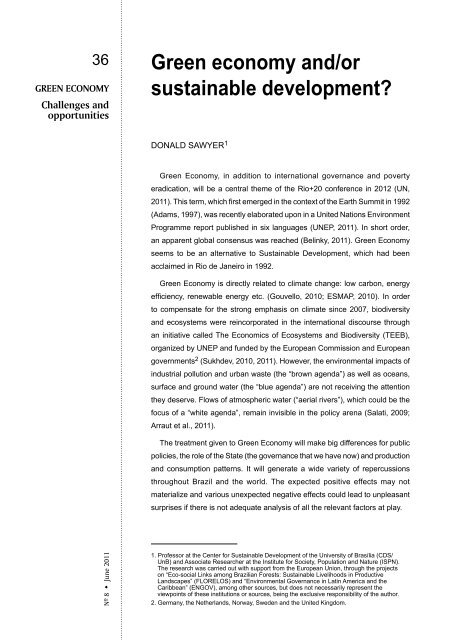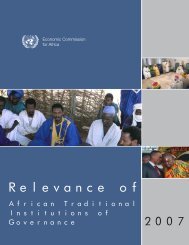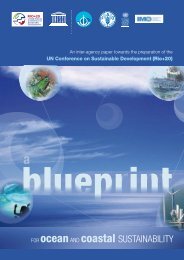Download Publication - Rio+20
Download Publication - Rio+20
Download Publication - Rio+20
Create successful ePaper yourself
Turn your PDF publications into a flip-book with our unique Google optimized e-Paper software.
36<br />
GREEN ECONOMY<br />
Challenges and<br />
opportunities<br />
Green economy and/or<br />
sustainable development?<br />
Donald Sawyer 1<br />
Green Economy, in addition to international governance and poverty<br />
eradication, will be a central theme of the <strong>Rio+20</strong> conference in 2012 (UN,<br />
2011). This term, which first emerged in the context of the Earth Summit in 1992<br />
(Adams, 1997), was recently elaborated upon in a United Nations Environment<br />
Programme report published in six languages (UNEP, 2011). In short order,<br />
an apparent global consensus was reached (Belinky, 2011). Green Economy<br />
seems to be an alternative to Sustainable Development, which had been<br />
acclaimed in Rio de Janeiro in 1992.<br />
Green Economy is directly related to climate change: low carbon, energy<br />
efficiency, renewable energy etc. (Gouvello, 2010; ESMAP, 2010). In order<br />
to compensate for the strong emphasis on climate since 2007, biodiversity<br />
and ecosystems were reincorporated in the international discourse through<br />
an initiative called The Economics of Ecosystems and Biodiversity (TEEB),<br />
organized by UNEP and funded by the European Commission and European<br />
governments 2 (Sukhdev, 2010, 2011). However, the environmental impacts of<br />
industrial pollution and urban waste (the “brown agenda”) as well as oceans,<br />
surface and ground water (the “blue agenda”) are not receiving the attention<br />
they deserve. Flows of atmospheric water (“aerial rivers”), which could be the<br />
focus of a “white agenda”, remain invisible in the policy arena (Salati, 2009;<br />
Arraut et al., 2011).<br />
The treatment given to Green Economy will make big differences for public<br />
policies, the role of the State (the governance that we have now) and production<br />
and consumption patterns. It will generate a wide variety of repercussions<br />
throughout Brazil and the world. The expected positive effects may not<br />
materialize and various unexpected negative effects could lead to unpleasant<br />
surprises if there is not adequate analysis of all the relevant factors at play.<br />
Nº 8 • June 2011<br />
1. Professor at the Center for Sustainable Development of the University of Brasília (CDS/<br />
UnB) and Associate Researcher at the Institute for Society, Population and Nature (ISPN).<br />
The research was carried out with support from the European Union, through the projects<br />
on “Eco-social Links among Brazilian Forests: Sustainable Livelihoods in Productive<br />
Landscapes” (FLORELOS) and “Environmental Governance in Latin America and the<br />
Caribbean” (ENGOV), among other sources, but does not necessarily represent the<br />
viewpoints of these institutions or sources, being the exclusive responsibility of the author.<br />
2. Germany, the Netherlands, Norway, Sweden and the United Kingdom.

















